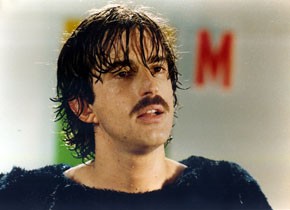Nanni Moretti
January 11 to February 2, 2006
Born in 1953, Nanni Moretti established his rank as the most important Italian filmmaker of his generation at an early age. He began producing short Super-8 comedies when he was 20. After frustrating experiences with the conventional production machinery, these were followed by his feature film début, carrying the programmatic title Io sono un autarchico (I am Self-sufficient, 1976).
It was with this work and with his role in Padre Padrone (1977) by Paolo and Vittorio Taviani that he became the star of a new Italian film culture virtually overnight. His films, his humour and his attitudes have remained “autarchico” to this day, from Ecce Bombo (1978), a kind of post-68-answer to Fellini's I vitelloni, to the worldwide success of La Stanza del Figlio (The Son's Room, 2001).
The classical dramatic form of the latter occupies a unique position in Moretti's film oeuvre. His works are interventionist documents of contemporary Italy, taking stock both in a personal and political sense.
The close link between cinema, biography and politics can be followed throughout Moretti's career, and not only in the form of his cinematic alter ego Michele Apicella, whose story he continues to write in several films. Moretti also has an important function as a critical voice in Italian public discourse, in addition to his support for alternative film culture in Italy.
He runs the Nuovo Sacher cinema in Rome and promotes young directors by offering his services as principal actor and producer, as in the film La portaborse by Daniele Luchetti or La seconda volta by Mimmo Calopresti.
While still in school, Moretti started his water polo career which eventually took him to the top league in Italy. In this period he also became a passionate cinephile; legend has it that he traded his stamp collection for a Super-8 film camera. The unexpected success of his first feature made it possible for him to switch to 35mm, but this changed his film aesthetic as little as it did the subjects of his works.
Ecce bombo, the portrait of a generation, describes the disillusionment of the left in the 1970s and the desperate idealism of the hero in his battle against an increasingly conformist society. The frustrated director in Sogni d'oro (Sweet Dreams, 1981), the pedantic teacher in Bianca (Sweet Body of Bianca,1984), and the doubting priest in La messa è finita (The Mass is Ended, 1986) are all perfectly tragic-comic creations whose neuroses are uncannily similar to Moretti’s own.
The culmination and high point of this first phase is Palombella rossa (Red Wood Pigeon, 1989), in which Moretti refines his episodic narrative style and in which he takes up all his personal obsessions. The Communist party official Michele loses his memory; he tries to find himself in the course of a water polo match while Dr. Zhivago is playing in the background.
A documentary parallel to this work is La Cosa (The Thing, 1990): here Moretti follows the fierce debate within the Italian Communist Party on its changing identity. The diary format of his subsequent works is already indicated in this film. In Caro diario (Dear Diary, 1993) and Aprile (1998), he intertwines autobiography with contemporary society, life and film more closely than ever before.
The ongoing debate with his adversary Silvio Berlusconi, which is a defining feature of Aprile, also contributed to Moretti's lengthy filmmaking hiatus. After La stanza del figlio he presented two short films, but these took a back seat to his political engagement. He is now developing the film Il caimano (The Caiman) – a "portrayal of the mores in Italy under Berlusconi."
The Nanni Moretti Retrospective is generously supported by the Italian Cultural Institute in Vienna.


